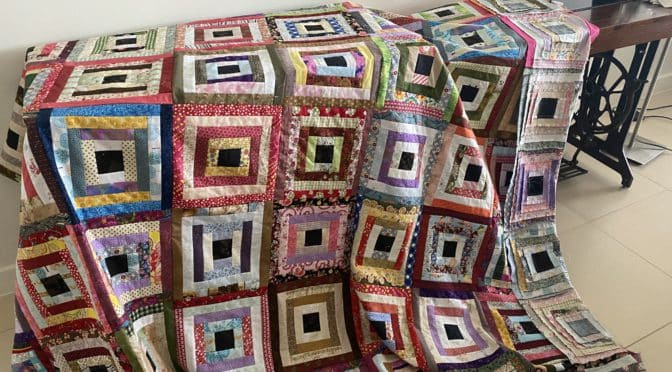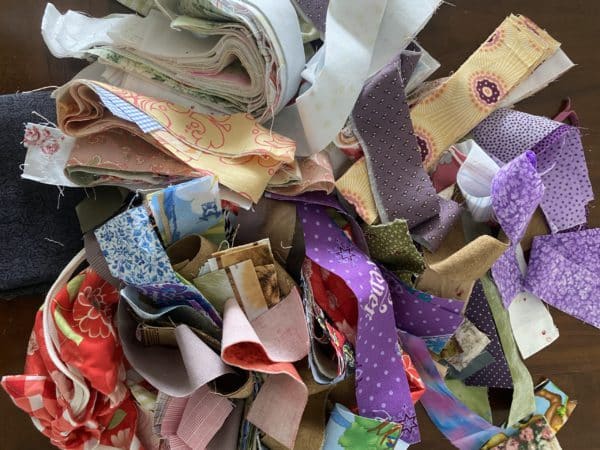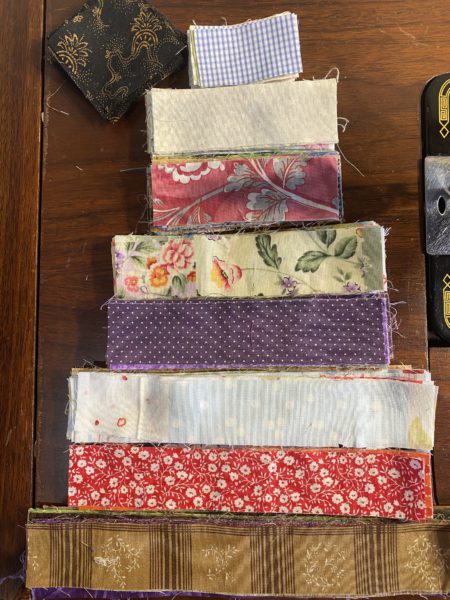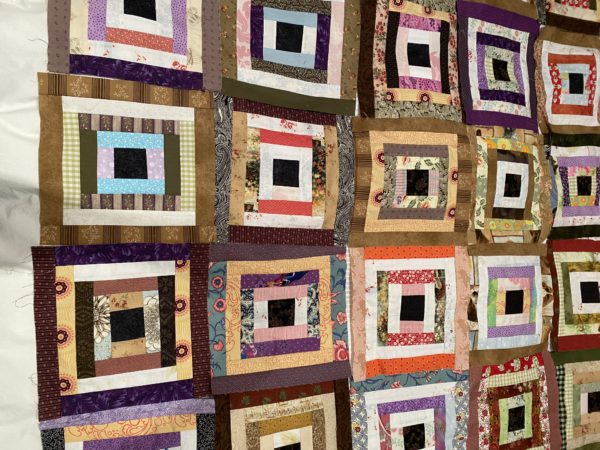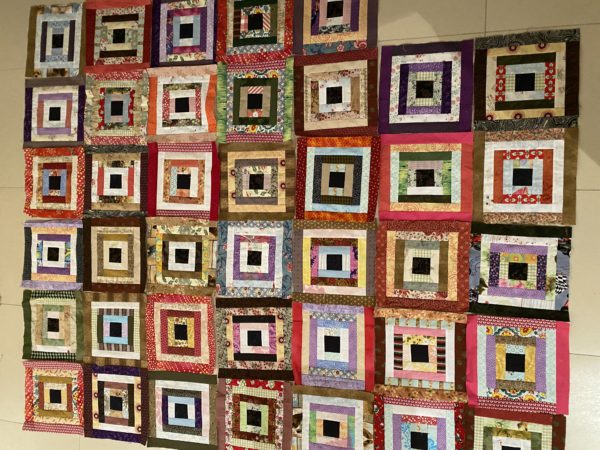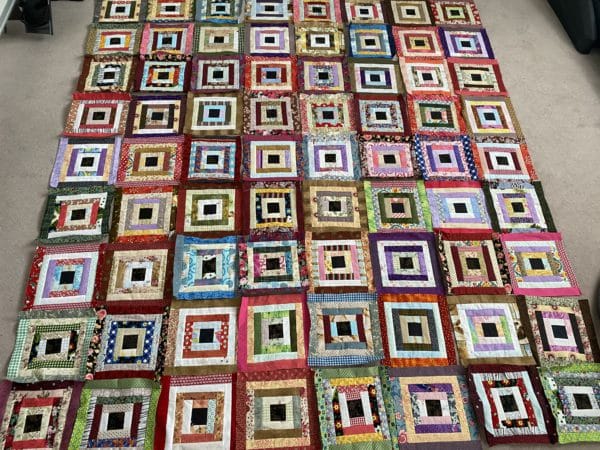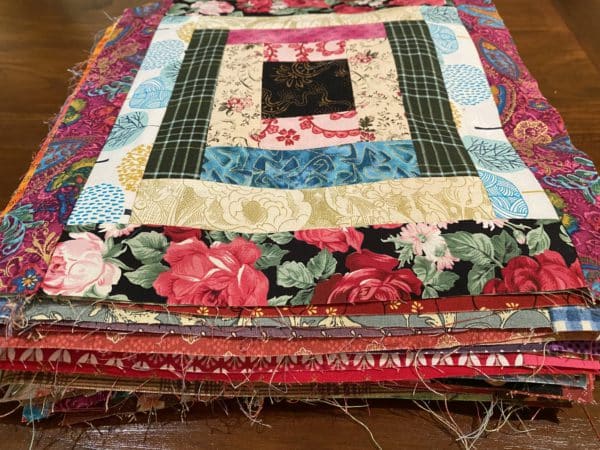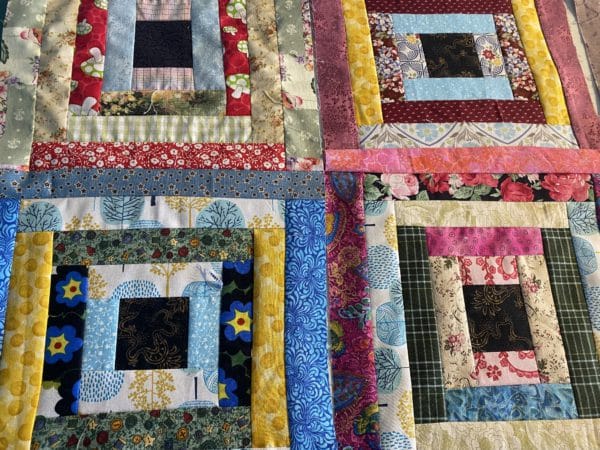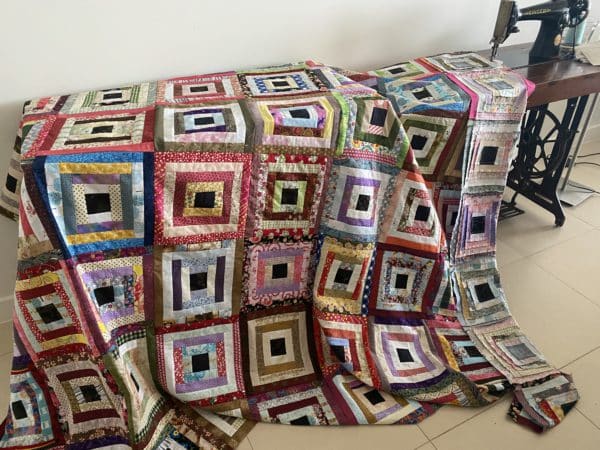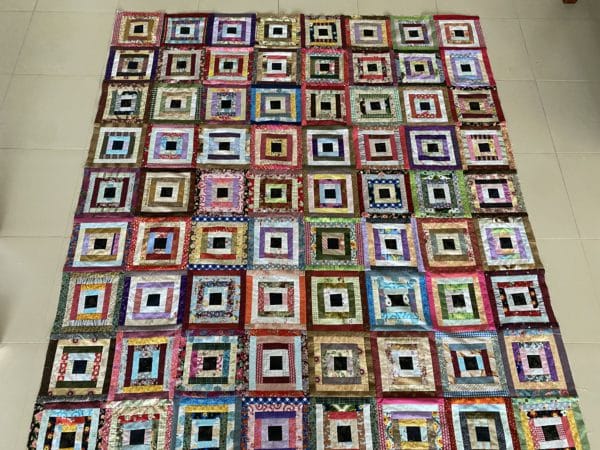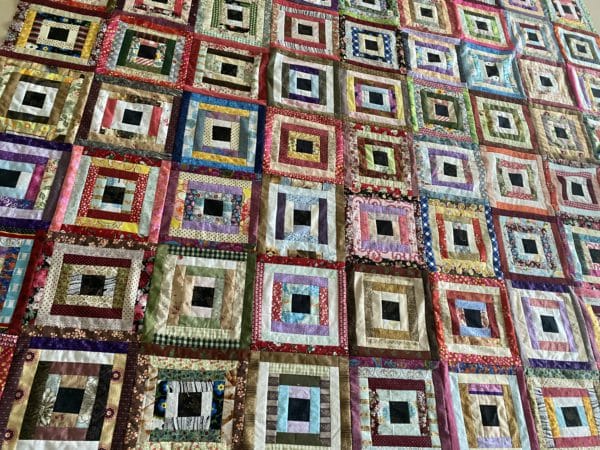Scrappy Housetop Log Cabin Variation Quilt Top Vintage Inspired
Hello Dear Friends and Readers, I know I have been on a bit of a Log Cabin fest recently, but hey, the scraps are being put to good use. If you have been joining me on this journey I would really like to encourage you to use those scraps especially the ones you don’t care for that much! They will be transformed!! 😁
I have to admit to feeling a sense of accomplishment today. I have cut up lots of 1 1/2” fabric strips ready for making this Scrappy Housetop Log Cabin Variation Quilt Top Vintage Inspired. (Technically it is a Courthouse Steps variation)
Honestly this is quite a lot of fabric, collectively approximately 8 yards / metres of scraps which are going to have a home in this Scrappy Housetop Log Cabin Variation Quilt Top Vintage Inspired.
For this quilt top, my constant is the black centre squares, which are also scrappy. I have used all kinds of prints without discriminations, so it is a true scrappy quilt. In this quilt there is a myriad of prints including novelty, plaids, brights, batiks, reproductions, florals, directional prints, plaids, ginghams, shirtings, solids, moderns and Japanese prints. All I had to decide is whether they were light or dark!
Previously I posted the directions for making the block here.
Log Cabin Variation – Scrappy Housetop Log Cabin Block Tutorial
Here is what I started with. Looks like a mess, don’t you think? All the strips need to be sorted into light or dark, as best as possible.
My vintage inspiration is here, https://www.soulsgrowndeep.org/gees-bend-quiltmakers.
Block size 10 1/2“ x 10 1/2“.
Finished quilt top size 80 1/2“ x 90 1/2“.
TIP
If you can’t decide whether it is light or dark, make sure it lies next to a more contrasting fabric, OR, for example if you need light but it looks more medium, turn it over and use the reverse,
Now they are all cut up and ready to go! Check it out
Requirements for the Scrappy Housetop Log Cabin Variation Quilt Top Vintage Inspired
72 of black centre squares 2 ½ x 2 ½
All the strips are cut from 1 ½” width of fabric strips. The cutting goes quite quickly because we are using 2 each of each strip size and fabric for each block.
Light strips – 144 each of 2 ½, 4½”, 6 ½”, 8 ½” lenghts.
Dark Strips – 144 each of 4 ½”, 6 ½”, 8 ½” and 10 ½“ lenghts.
Follow the instructions for making the blocks as written in the post Log Cabin Variation – Scrappy Housetop Log Cabin Block Tutorial as previously mentioned. Here is how they are beginning to look after about 20 blocks.
I like the dramatically visual effect that the black centres help create along with the contrasting light and dark fabrics,
Here I have made 40 blocks. They are not put together yet. They look pretty striking.
I have been sewing all these blocks by treadle. Its very nice just being in the zone. I think its a bit like meditation. Very enjoyable and relaxing. no stress as they are just scraps!
Now I have made the 72 blocks. Here are the blocks laying out. not pressed yet.
Now the blocks have been nicely pressed and I am sewing them together. Im using this Singer 201k treadle which is such a beautiful little stitcher. She sews like a dream.
TIP
When sewing the quit together, after sewing the first column of blocks, pin the edges of the first column of blocks together. This prevents the blocks from getting tangled as the subsequent columns are added. This is a great time saver! 😊
Build the Scrappy Housetop Log Cabin Variation Quilt Top Vintage Inspired
Warning!! Ha ha, this is a very easy quilt top to put together. There is very little seam matching except for joining the blocks and ensuring the seams are nicely nested!!
When laying out the blocks I have alternated the blocks so that there is no seam matching.. That is the last long 10 1/2“ strips of each block alternate, vertical horizontal vertical and so on.
I like to chain sew the whole quilt top together by adding all the blocks in columns and then turning the whole top to sew all of the rows. This scaffolding technique makes building the quilt very easy and the seams lay nicely. See the tip above for a smoother experience. This link explains this technique using a small block.
36 Patch Postage Stamp Blocks Tutorial
I have set these blocks in a 8 x 9 blocks configuration. here it is coming together on my little Singer 201k treadle.
TIP
I used an extra table next to the machine to help support the weight of the quilt top.
Here is my final layout of the Scrappy Housetop Log Cabin Variation Quilt Top Vintage Inspired.
I think is is a a great way to use up a lot of scraps!
If you enjoyed this post you may also like
Weekend Scrappy Half Log Cabin Quilt -Vintage Inspired
Crazy Little Log Cabin Coasters
Log Cabin Free Motion Quilting
I hope you can do some sewing or cutting today.
Susie
© Susan Stuklis 2022

